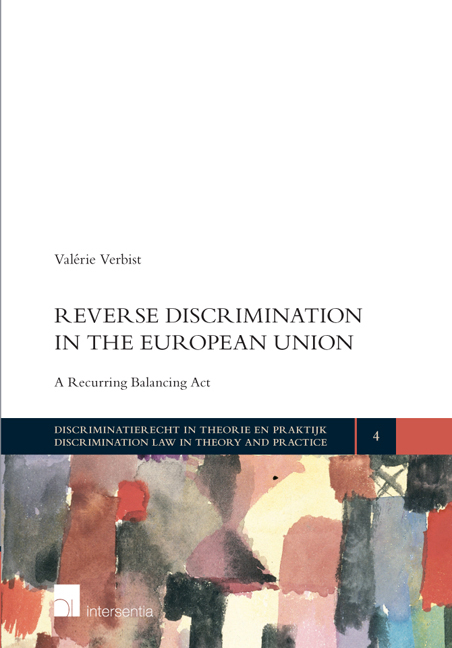Book contents
- Frontmatter
- Acknowledgements
- Contents
- Table of Cases of the European Court of Justice
- Chapter 1 Introduction
- Part I Reverse Discrimination from a Union Perspective
- Part II Reverse Discrimination from National Perspectives
- Chapter 4 Reverse Discrimination with Respect to Goods
- Chapter 5 Reverse Discrimination of Persons
- Conclusion Part II
- Part III Reverse Discrimination in a Federal State Context
- Bibliography
Chapter 5 - Reverse Discrimination of Persons
from Part II - Reverse Discrimination from National Perspectives
Published online by Cambridge University Press: 29 September 2018
- Frontmatter
- Acknowledgements
- Contents
- Table of Cases of the European Court of Justice
- Chapter 1 Introduction
- Part I Reverse Discrimination from a Union Perspective
- Part II Reverse Discrimination from National Perspectives
- Chapter 4 Reverse Discrimination with Respect to Goods
- Chapter 5 Reverse Discrimination of Persons
- Conclusion Part II
- Part III Reverse Discrimination in a Federal State Context
- Bibliography
Summary
Classic free movement rights of persons is discussed separately from family reunification, the latter based on Directive 2004/38 or on Articles 20 and 21 TFEU on Union citizenship, even though it has been argued that ‘the Court appears to be moving towards a convergence of approach under articles 45, 49, 56 and now article 21(1) TFEU on citizenship’. Two main reasons relating to the nature of family reunification justify this decision. First, family reunification concerns derived rights for third country nationals who are family members of Union citizens while classic economic free movement rights concern Union citizens directly. Secondly, family reunification is one of the main sources of immigration to the EU, and immigration is traditionally a competence of the sovereign State, which makes it a delicate issue politically.
CLASSIC ECONOMIC FREE MOVEMENT RIGHTS OF PERSONS
Reverse discrimination in the area of the classic economic free movement of persons often occurs in the area of employment. In particular, a lot of cases concern professional qualifications. For instance, Member States sometimes reserve certain jobs for persons with a very specific education or diploma. This kind of regulation aims to guarantee a high quality of work. However, it is often incompatible with the Treaty provisions on free movement because it creates a restriction to free movement within the EU, perhaps because the education or diploma may not exist in that form in other Member States, for instance. Moreover, a lot of cases of reverse discrimination concern employment conditions such as less favourable wage-setting mechanisms or fixed-term contracts instead of contracts of an indeterminate duration.
Reverse discrimination in the area of the classic economic freedom of movement for persons also occurs regarding the rights of persons acquiring goods. For instance, some Member States impose authorisation procedures on the acquisition of buildings and land, or they subject the right of heirs to cumbersome modes of evidence of their status and/or rights. Since these strict conditions are often considered to comprise restrictions to free movement within the EU, they only remain applicable to purely internal situations and hence situations of reverse discrimination arise.
- Type
- Chapter
- Information
- Reverse Discrimination in the European UnionA Recurring Balancing Act, pp. 197 - 256Publisher: IntersentiaPrint publication year: 2017



